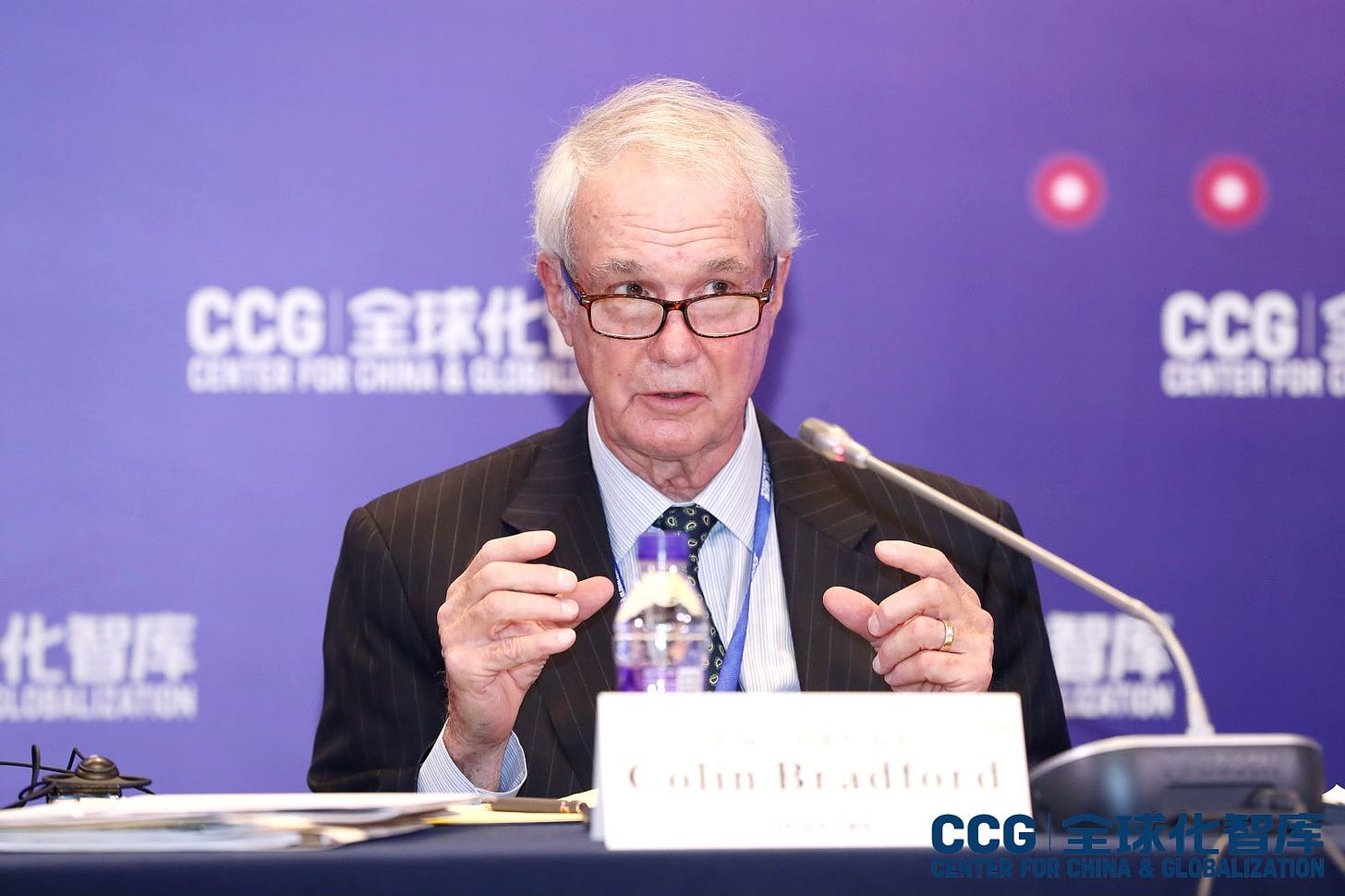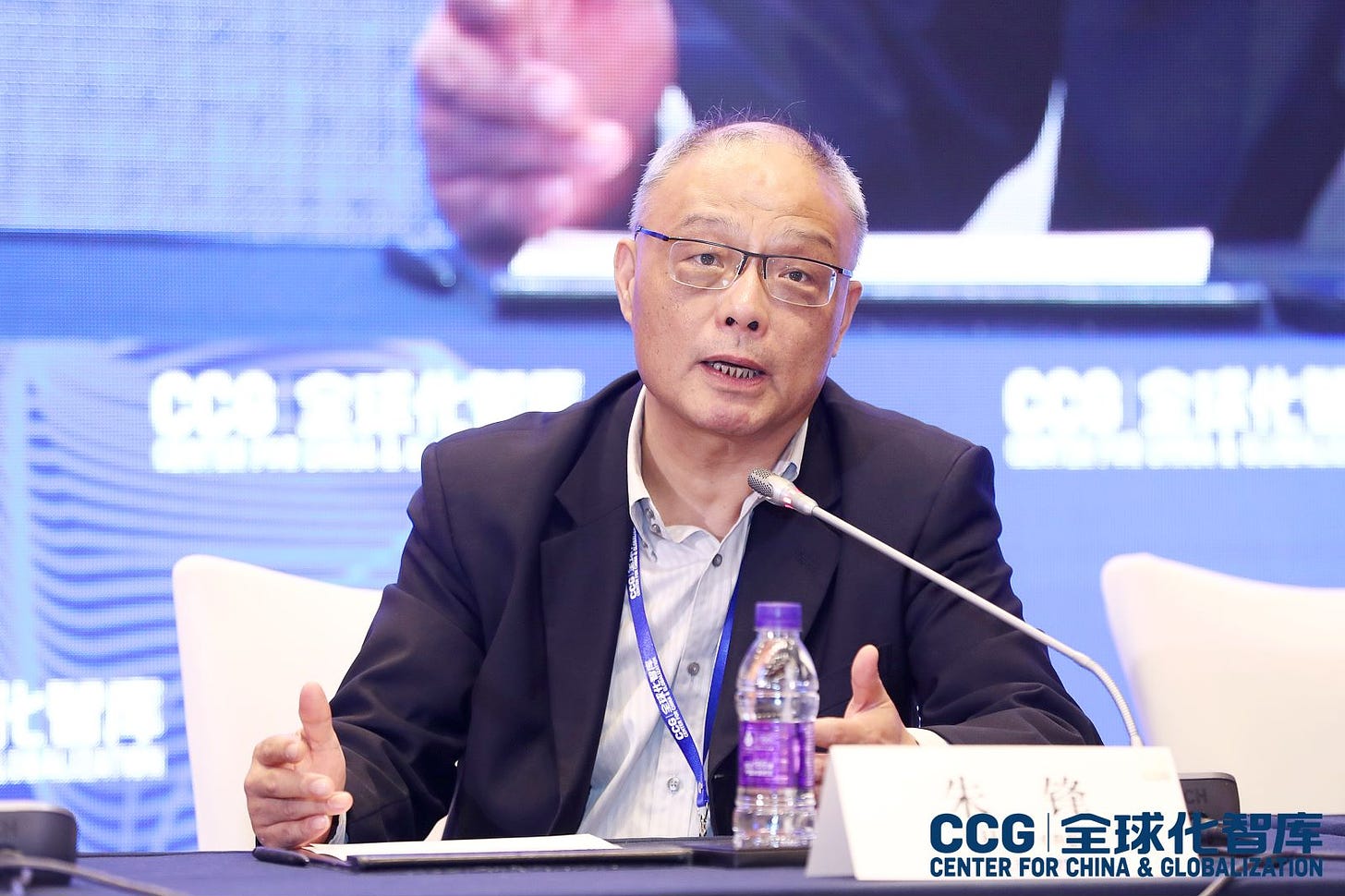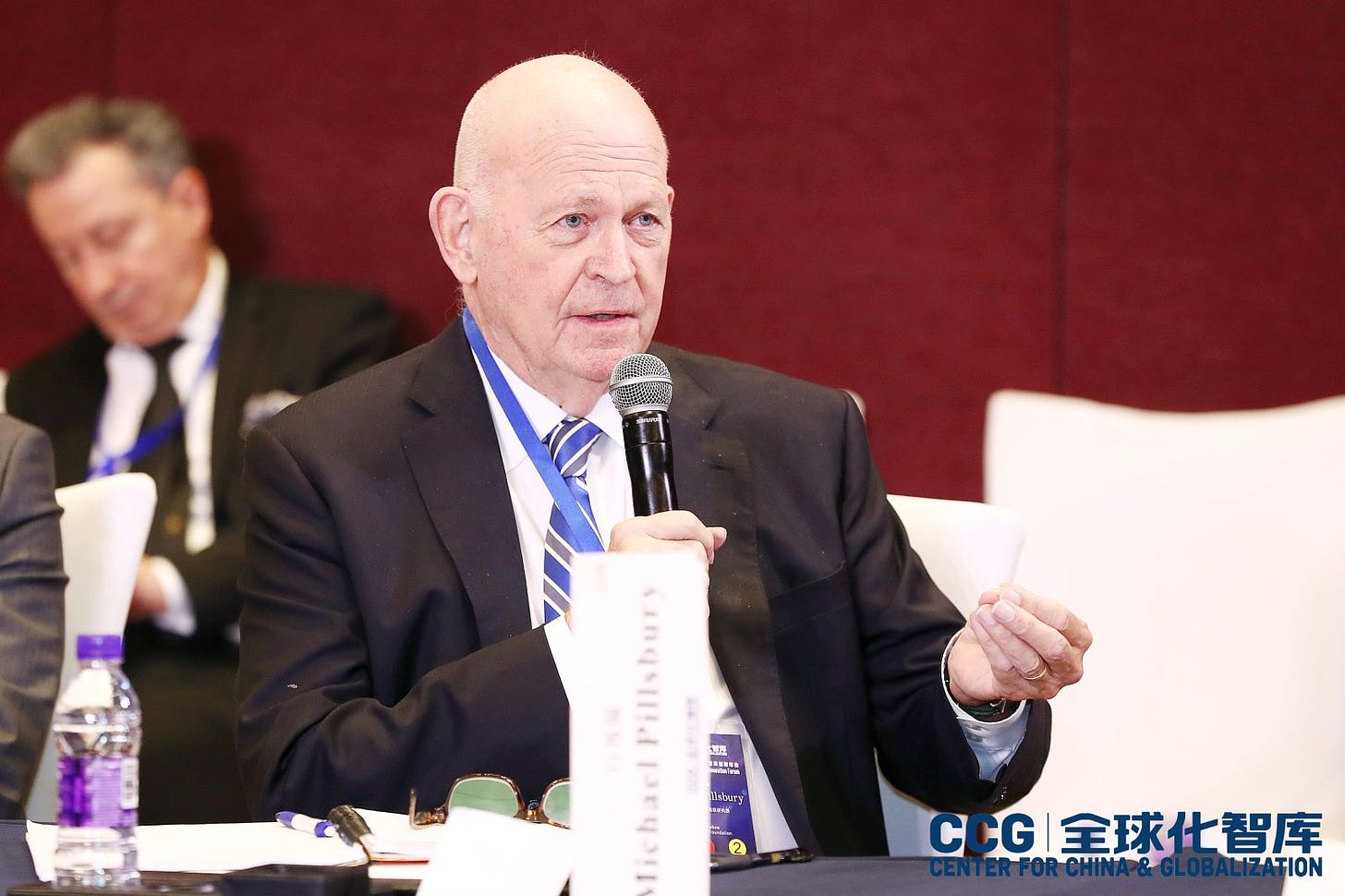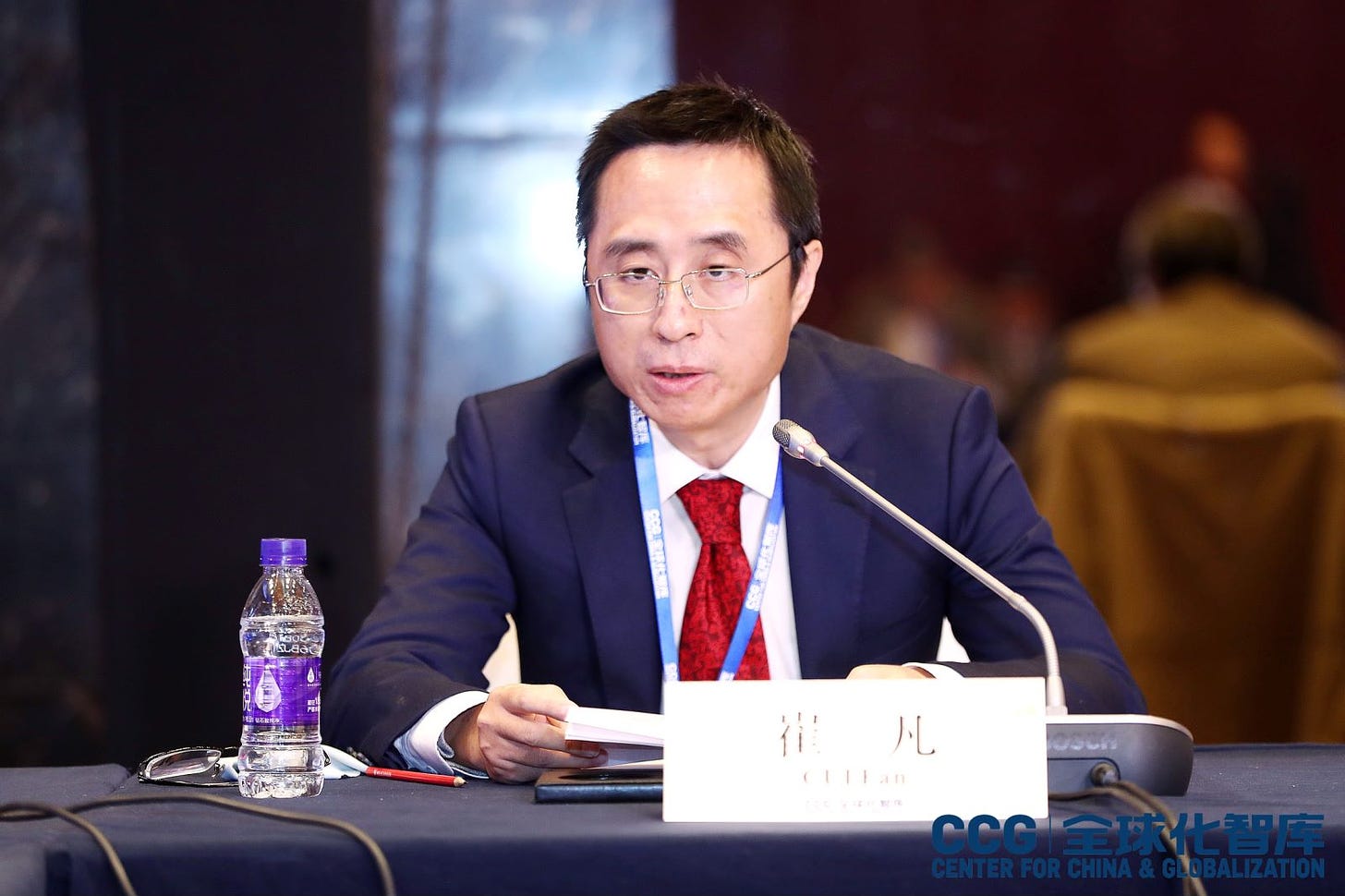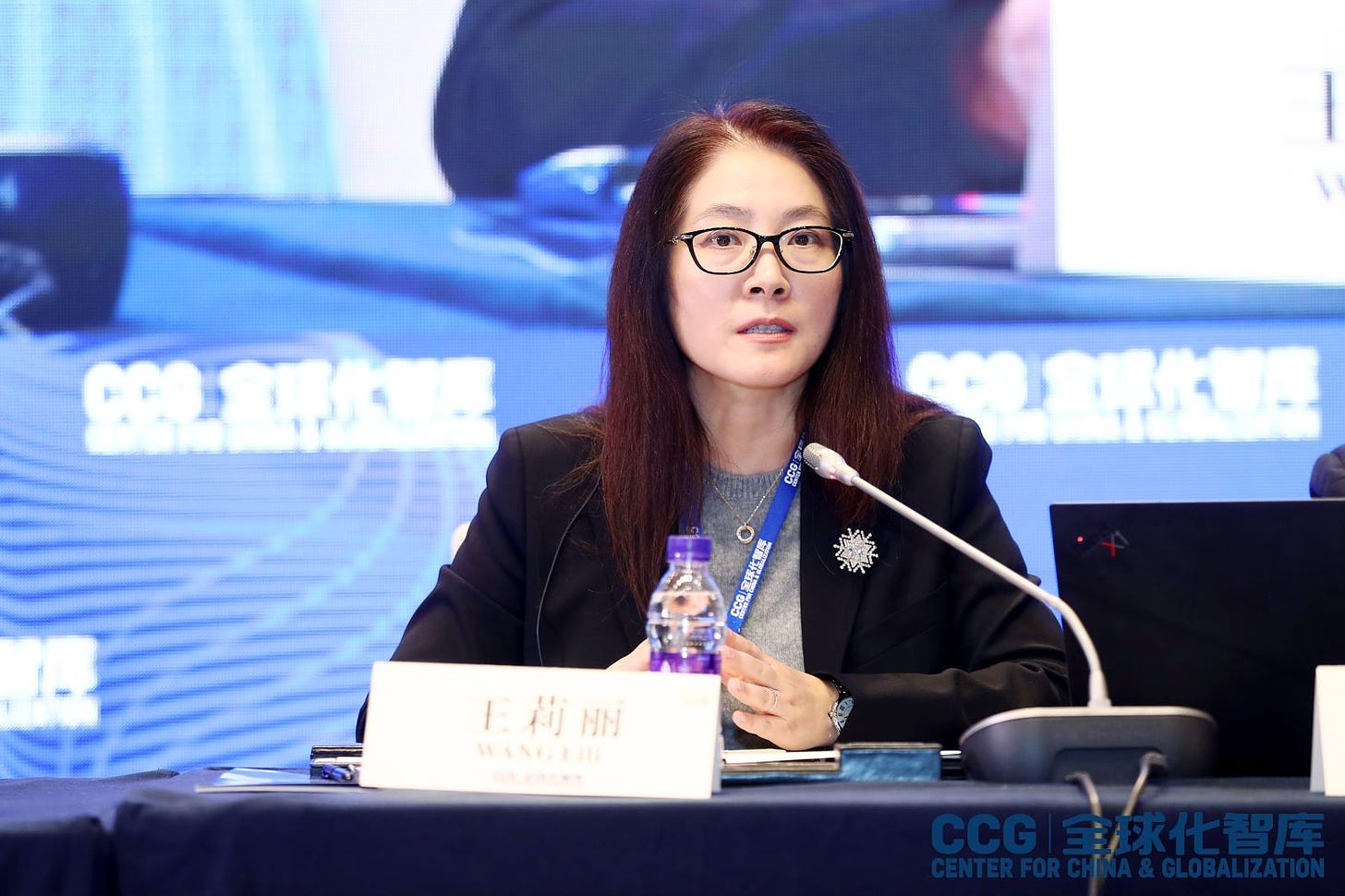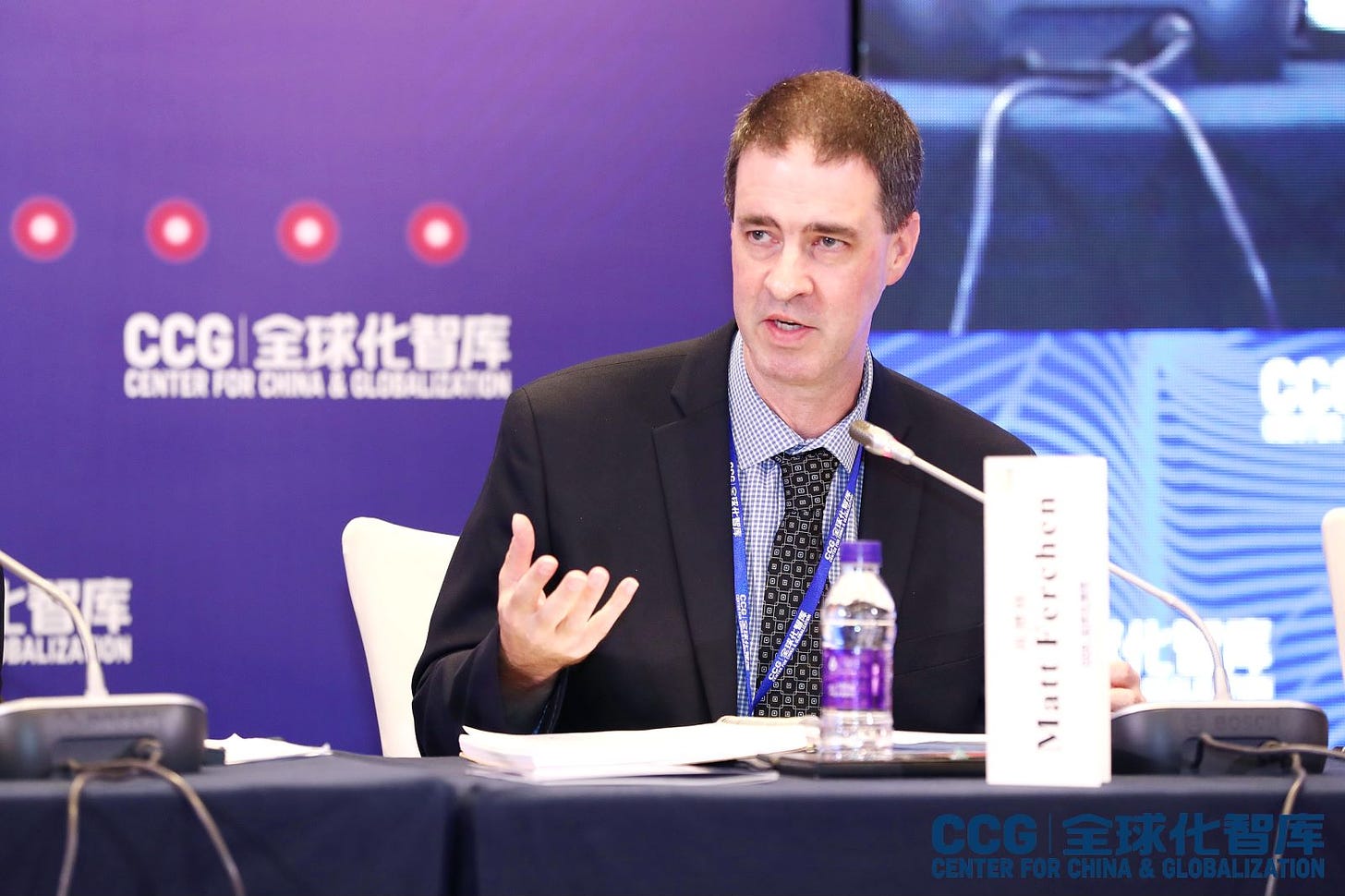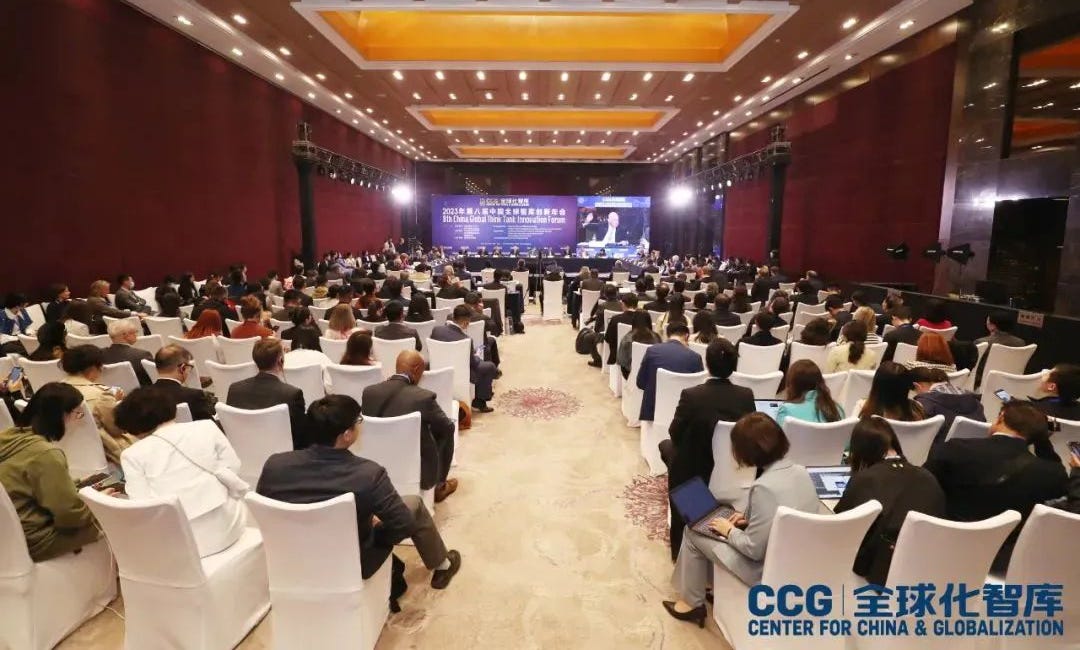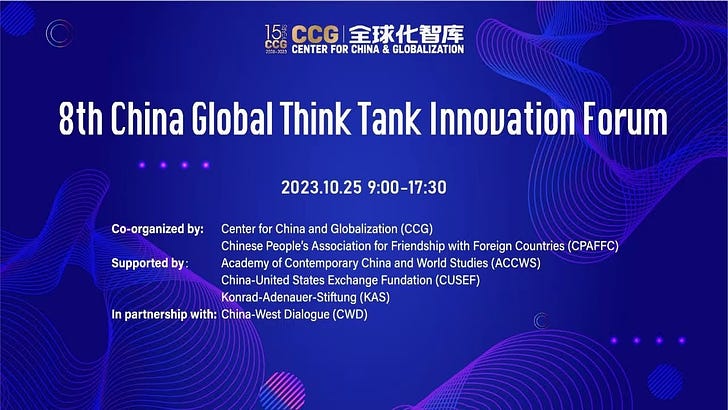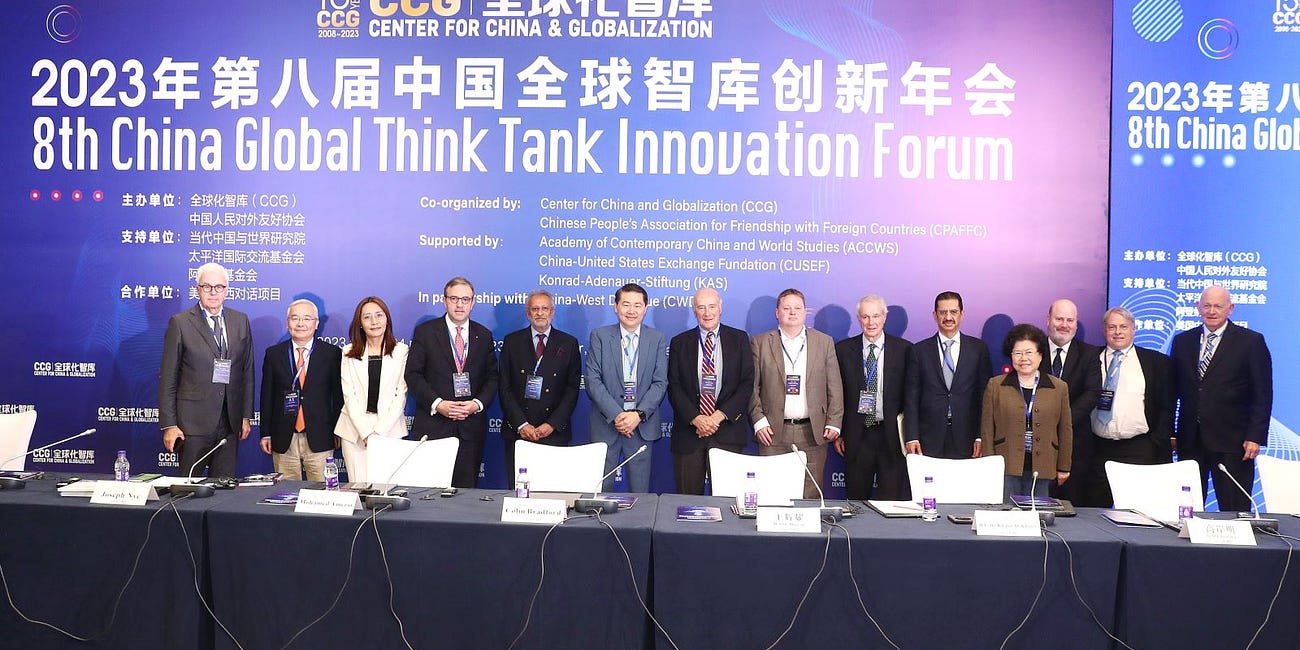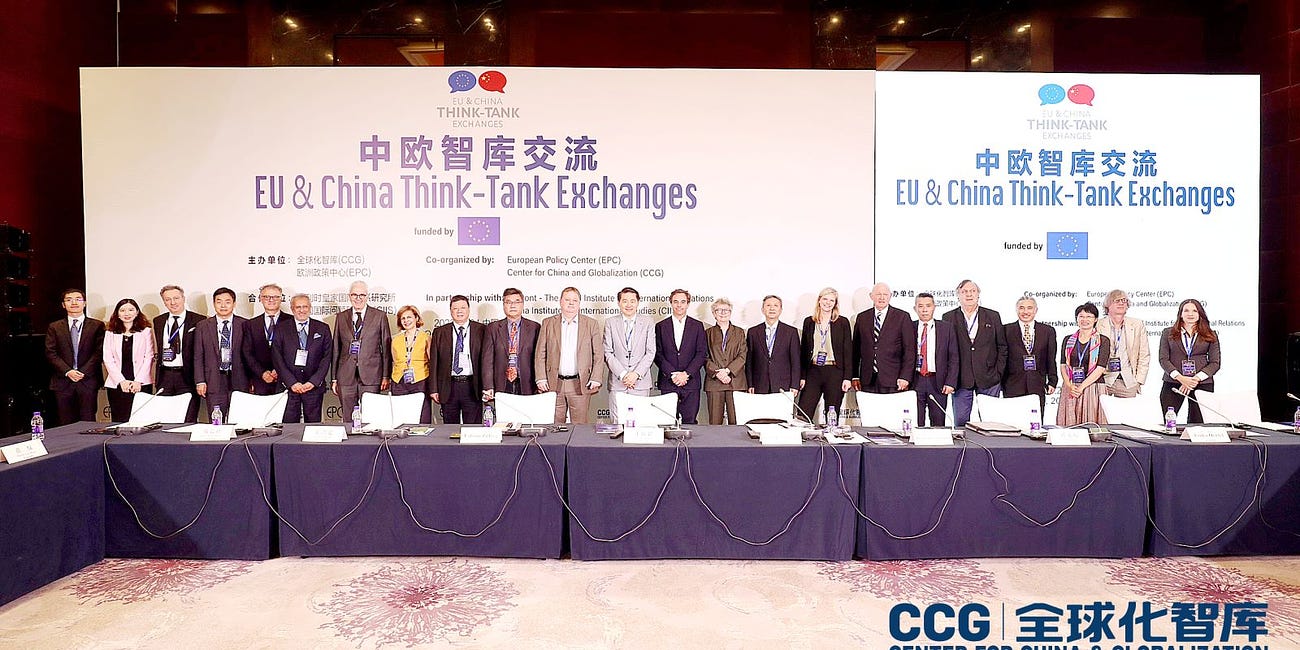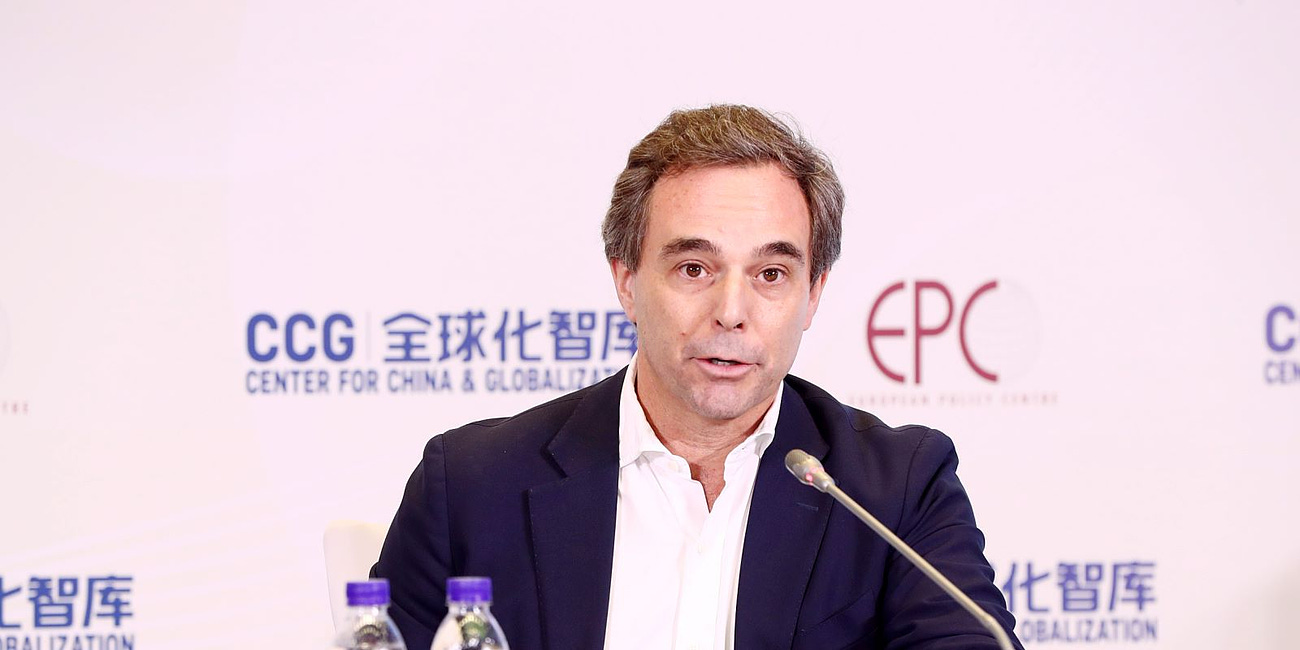Part I of "Reframing US-China Bipolar Dynamics by Pluralizing into China-West Relations"
ZHU Feng, Michael Pillsbury, Fabian Zuleeg, REN Xiao, CUI Fan, WANG Lili, Matt Ferchen underscored the gravity of "the most important bilateral relationship in the world."
As President Xi Jinping meets with President Biden after more than a year, CCG Update is pleased to present Part I of the transcript of "Reframing US-China Bipolar Dynamics by Pluralizing into China-West Relations" roundtable from the 8th China Global Think Tank Innovation Forum. This is the second roundtable of the event, following the opening remarks and the first roundtable themed "The Global Order at A Crossroads: Ways Forward".
The Oct. 23 forum was organized by the Center for China and Globalization (CCG) and Chinese People's Association for Friendship with Foreign Countries (CPAFFC), supported by the Academy of Contemporary China and World Studies (ACCWS), China-United States Exchange Foundation (CUSEF), and Konrad-Adenauer-Stiftung (KAS), in partnership with China-West Dialogue (CWD).
The full video is available on YouTube. It was also broadcast online by CCG and remains available in China both in English and Chinese.
This transcript covers seven speakers:
ZHU Feng, Academic Council Expert of CCG; Executive Dean of School of International Studies, Nanjing University
Michael Pillsbury, Senior Fellow, The Heritage Foundation
Fabian Zuleeg, Chief Executive and Chief Economist, European Policy Centre (EPC)
REN Xiao, Professor, Institute of International Studies, Fudan University; Director, Centre for Chinese Diplomatic Studies
CUI Fan, CCG Non-resident Senior Fellow; Professor, University of International Business and Economics (UIBE)
WANG Lili, Deputy Dean of National Institute of Development and Strategy, Renmin University of China
Matt Ferchen, Senior Research Scholar and Senior Fellow, Paul Tsai China Center at Yale University Law School
This discussion was moderated by Colin Bradford, Nonresident Senior Fellow of the Global Economy and Development Program, The Brookings Institution; Co-Lead, the China-West Dialogue.
Please note that this transcript is transcribed by CCG from the audio and video recordings and may contain errors. It hasn’t been reviewed by the speakers.
ZHU Feng, Academic Council Expert of CCG; Executive Dean of School of International Studies, Nanjing University
I think the time has been running tougher, even tougher than most times since the end of the 2nd World War. The reason is multiple. First of all, we see a global issue is hitting the earth harder. The other is we're seeing power redistribution. Today, yes, no matter how attractive pluralism is, the real power structure remains unipolar. My friend, Professor John Ikenberry, once made a great point. He said he concluded the unipolar moment might be the best distribution of power. In history, the reason is America, by nature, is a benign power. A benign hegemon. But it seems to me now his theory is just going empty.
I think a couple of the domestic reasons are also running very high. For example, what about American domestic politics? I'm dean for the School of International Studies at Nanjing University. I'm also specializing in American studies. Today's American domestic politics really make all American observers very, very strange. And I'm also very curious: what is happening in your country? Since President Lincoln declared the liberation of black slavery, I see the US has never been more divided, falling, tumbling into domestic, some sort of, fragmentation and even frictions.
But the problem is, foreign relations and domestic politics are always indispensable. It's a vertiginous combination. So, it makes a lot of sense to me: as long as the US feels vulnerable domestically, the US consensus is running high. Many American elites, policymakers, and even political figures prefer to play up China's threat as high as possible, making use of the idea that China poses an international threat to the US Therefore, the China threat becomes a facilitator for American domestic politics, to achieve cohesion and even unity. In that sense, I really feel very disillusioned about China-US relations. Because as long as the political peculiarity of the United States doesn't change, I see there's no room for our relations to improve.
So that's why, when we think about whether pluralism will be booming in the future, to be honest, there is no way at all. I read The New York Times, Washington Post, and Wall Street Journal every day. I see some sort of very dramatic domestic political tone. The US never changes, and whether China should become some sort of debate is increasing, but the problem is the US now has decided to make use of the China factor. So then, against this backdrop, no matter how we try to pull the relations closer or make some sort of compromising gesture, how can our bilateral relations finally and eventually skip over the domestic barriers in the United States? So as a professor, I have to say, as long as American domestic politics remain highly fragmented and fractured, there's little hope that both governments could truly give a warm embrace.
But the problem we face is the way this, some sort of, we say, terrible reality. Is there any way we can work on this together? Yes, we can work together. Yeah, I see people-to-people relations as always, some sort of a significant cushion to any escalation. If we just have a quick, even brief look at our history, going back to the 30s last century. What was China then? China was something small, a weak girl who deserved a lot of sympathy from Americans. But after Japan invaded China, China also became the most reliable ally to the US. Now, I'm a worker from Nanjing University. Nanjing is a real historical witness to how rich and robust our historical connection once used to be. So, people-to-people relations should go beyond something political, you know, arguments and political fragmentation, and keep both people sticking together because we need to know more about each other.
Today, China is indeed reemerging, but it remains largely a transitional power. Of course, sooner or later, China will also become a shining democracy; there is no question about that. However, how can American friends maintain their confidence in China's future? So, today, I think after Joe Biden came to power, it has become clear to me that it has very poorly declared the real competition in today's world. It appears to frame the competition as solely between the US, representing democracy, and China and Russia, representing authoritarianism. I find this perspective a very vicious dichotomy and should be tossed aside. Otherwise, we cannot truly have a serious look at each other.
Secondly, I want to suggest that neither side should be smarty-pants. I'm serious. Yeah, Chinese and Americans, we are all very, very proud of our cultural civilization. That's the point I think President Biden made very correctly. He said, now, the competition and confrontation between Beijing and Washington is a competition between the two civilizations. But what civilization definitely means for policymakers and thinkers is that they consider themselves in a morally better position than you to ask you to do this, ask you to do that. If we always just move that way, China and the US, Chinese and Americans will very quickly become smarty-pants. What does smarty-pants mean? I mean, I always consider I'm great and you are wrong. So, we should really, really eliminate some sort of, as I mentioned, such a vicious dichotomy, and create some sort of more space, not just practically, but also spiritually, yeah, to keep both sides accommodating with it.
The last point I want to say is this. Why does the US remain very, very stable, and robust in your unipolar position? Because your network proves to be much more robust than China's. So, China, that's also one point. China also wants to learn from the US. Yes, today, China just believes we did a lot of things. We are the biggest contributor to the world economic growth. We're also the first donor of COVID medicines and rescue aid to third-world countries. But there's no way China should always just feel proud of how good we are. What's most important is how broad and profoundly China's network is spread out. So, from this standpoint, China's future reemergence has no way to skip the US, has no way to take a detour from our relations with Washington. My view on the US is also this: if the US could just feel, yeah, today, even just a unipolar moment, remaining just how, say, unshakeable. But how to pull China into some US-centered new global network? It's also another challenge.
So, conclusively, today's world situation is running tougher and harsher. But the problem is, I think the US and China should still form a pair to stick with each other. Let me stop here.
Michael Pillsbury, Senior Fellow, The Heritage Foundation
I have some ideas for your purpose of a vision statement or having consensus so we can report to governments, officials. You know, we have consensus about this. Please do something. Um, it's really one concept with three parts. There are three negotiations that have started in various ways between the US and China. Think tanks should not ignore these negotiations. You can attend the meeting; it's closed. What can you learn about it?
The first, and I would call them non-negotiations. These are three things that are not happening that any vision statement has to deal with. You can't just ignore it. The first one is the trade talks. The trade talks began when Liu He came to Washington, and there was a text that both sides put down their views, more than 20 demands on each side. The text grew longer and longer, finally 95 pages. There was some reneging; there were more tariffs. There are several books about this. One is the excellent Wall Street Journal book called Superpower Showdown, the inside story of the trade talks. Henry Wang Huiyao is actually in the book for the constructive role CCG played.
Now, these talks were resisted by China for two years. The Chinese side had some rough idea that they would have to make concessions in the trade talks. The American side punished China until the talks started. There was a mutual agreement. It was a done deal. The talks were supposed to have phase two. Things that were too hard for phase one, mainly subsidies, where the Chinese side would have to admit how much subsidies they have to various companies, and then whether that's WTO compliance or not. Now, the Biden administration appointed a Chinese American from the House Ways and Means Committee to be their US TR. The Chinese side refuses to negotiate with her. There are no phase-two talks at all. Phase one has largely not been implemented. Some things have been implemented. Trump calls it a success. The Chinese side refers to it sometimes as a success. So, can a vision statement or consensus ignore the Chinese side's refusal to have the trade talks continue? I put that as a question to you, Colin.
Second Negotiations were an idea that the Russians agreed with America. Big surprise, right? China was invited to come to the strategic stability talks, nuclear arms control discussions in Vienna. The US side put out, with the Russians' help, we put out a Russian flag, an American flag, and a Chinese flag, waiting for the Chinese delegation to come. They didn't come. Strategic stability talks have been endorsed by the Biden administration. The idea actually began under Obama when there were some strategic stability talks. This also has to do with activities in outer space. Our side has testified that China has developed a number of offensive capabilities in outer space, one of which is one satellite reaching out to another to grab it. Kind of like a James Bond movie. China can do this now. There's a number of other activities that the Russians and Americans would like to know more about. Why are you doing this? That's the strategic stability talks. China will not come. And they have various reasons. It's Cold War thinking, or our nuclear weapons are a very small number. We're not a great power like you and Russia. But this is different from Xi Jinping's own speeches, where he says China's DNA and culture help China contribute to the global order. So, no trade talks, no strategic stability talks.
And then there's a particularly strange Chinese refusal. And I can give you the reasons China says no military-to-military contact. Now, this has built up since the '70s. I myself was personally involved in the military talks. They were very helpful to both sides. The generals and admirals on each side could try to understand, like you're talking about listening today. Each side would listen to the other. Out of it came an agreement. It's a kind of like an Incidents at Sea agreement we had with the Soviet Union but different for China. Mutual notification of maneuvers, not going too close to each other's ships, not having navy fighter aircraft suddenly surprise each other. Very constructive. The Chinese side has stopped these talks. They refused to restart them. It's been a Biden request now for two years. The Chinese explanation, well, you put sanctions on our 国防部长, our Defense Minister, Mr. Lee, and we can't, you know, have military contact while you have these sanctions on. Okay, but is that supposed to be 100 years, or how long are we not going to have military exchanges and contacts? It's quite important, Colin, in terms of accidental war. If you saw Joe Nye's upped piece in December last year, he specifically warns of an accident like the assassination that begins World War One. Many people are scared about this. We have no military channel, not before the American side for our domestic politics, as Zhu Feng said, but because the Chinese side refuses to start the talks. We have a rumor that the Foreign Ministry, other parts of the Chinese government want these talks to start again, but PLA is in charge of the talks, and they say no.
Now, I'm only giving you three examples of negotiations that are not going on. There are more examples. So, the visionary statement, if you want consensus, I think, cannot ignore these issues and address microeconomics or, you know, social middle-class needs. That's all important. But I put it to you as a question: isn't there a cost to any kind of consensus that leaves out at least these three negotiation issues that are not happening because of the Chinese side?
Fabian Zuleeg, Chief Executive and Chief Economist, European Policy Centre (EPC)
I wanted to make two points, really, on the subject of multipolarity. And it's interesting that we've so far had a US-China conversation. So maybe I'll bring in a European perspective to make it less bipolar in the direct. So, I wanted to make one comment really, on how does the polarity in the world look from a different perspective, from countries which are not within those two. What is often seen as the bipolar power structure. And sometimes it's hard to avoid the conclusion that it's bipolarity when you see how certain countries act. If countries force other countries to make a choice, to decide to be on one side or the other, then it becomes a very bipolar world. And I think is important that there's a recognition that those countries which have great power also have to exercise restraint and responsibility. I think the second point really, I wanted to ask is, is multipolarity analytical, or is it aspirational, or maybe a bit of both? And if it is aspirational, how do we turn this into a concept which can practically engender corporation? How do we overcome the barriers which are there for corporation at the moment? And there, I think what really, for me, needs to be the focus here is the question of trade-offs, the question of transition costs, the question of distributional costs. trade-offs, transitional costs, and distributional costs. Because a lot of the changes we're going through globally, will have enormous consequences. So how do we deal with those in common when they affect different countries very differently?
REN Xiao, Professor, Institute of International Studies, Fudan University; Director, Center for the Study of Chinese Foreign Policy
I guess I have three points. First, I'd like to echo Colin Bradford's point on pluralism, which I think is an excellent point. Because pluralism is a fundamental fact of the world in terms of political and economic systems, values, cultures, civilizations, histories, whatever. You just need to name it. So, it is a fundamental fact of the world. And therefore, it is the starting point of any talk about the world, about relations, about anything. Pluralism just means difference, meaning that there are all kinds of differences in the world. And that leads to my second point.
The question is, how do we treat, how do we handle differences? 51 years ago, when President Nixon left the White House for his historic visit to China in 1972, people gathered together at the White House, members of the Cabinet, members of Congress, and other people. President Nixon said to the group, saying that, "Well, the government of the People's Republic of China and the government of the United States have differences, but they do not have to be enemies." I think that spirit has to be inherited by us today. To go one step further, in my opinion, differences do not necessarily lead to conflict, but also differences could be a source of inspiration. Because things are different, one can learn from the other sides, other people about many things. So, we must go one step further by pointing out that differences could be a source of inspiration for our progress and advance.
However, well, I believe that the world would be a better place if the American policymakers accept this philosophy, that differences could be a source of inspiration, a source of progress for us all. I say this because it is based on my long-time observation of the United States, politics, foreign policy, and philosophy. The United States has a very strong motivation, a sense of mission to change the world. The United States, as a national character, the country, is exceptional in terms of it has a very strong motive to change the world and to make the others more like "us," "us" meaning the United States. Now, China is different, and China is rising, and thus China is a threat. This logic is very problematic, in my opinion. Nowadays, the US policymakers use the term competition to characterize its relationship with China. And that, in my view, flows from the above-mentioned logic, but at least it is questionable. At least it is questionable. Someone is a threat simply because he is different or that country is different. It's very, very problematic. And it's wrong. I think, to use competition as a term to characterize the relationship between US-China, is at least too simplistic because that is only a part of the relationship. The relationship is very broad-based. It has many dimensions, including people to people. So, I don't think we can just use competition to characterize the US-China relationship. So, we need to rethink about it. We need to rethink about it very, very seriously.
Let me end by echoing Dr. Pillsbury's comments. I think you're quite right by saying that communication, good communication, and timely communication are very, very important for our bilateral relationship. However, to blame the other side is easy. Well, I believe we, in the room, have reasons, have legitimate reasons to blame the Chinese government and to blame the US government. We have probably many reasons to do so. That is easy. But that is not very useful. For instance, in the case of Defense Minister Lee, when he was and is still sanctioned by the US government. How can we accept the proposal for our defense minister and your defense secretary to have a meeting? It would be very difficult for us to accept that because that is simply an issue of dignity, right? So, for me, that is very easy to understand. And I hope our American colleagues and friends can understand that too. So, the issue was not to blame but to have good dialogue on that.
CUI Fan, CCG Non-resident Senior Fellow; Professor, University of International Business and Economics (UIBE)
Thank you very much. I got this topic. I think this is a big topic, but my time is little, so I made a little preparation for it. Just now, we talked about trade negotiations. Actually, the Secretary of Commerce of the United States, when visiting China at that time, the two sides just established ministerial advice, ministerial dialogue mechanisms. And then the finance ministry of the two countries also established a financial dialogue mechanism too. So, I think these dialogue mechanisms are smooth.
And just now, we mentioned trade negotiations. I think we're trying to go deeper into it. I want to share with you my personal observations about the trade negotiations. We know that the appellate system of the WTO is almost stopped, so it is in crisis. Now, we are concerned about this. Can we have any rules that can be mutually or universally accepted by both China and the United States?
We all recognize the market economy, but China's market economy is based on socialism. We allow different ownerships. But in the West, their market economy is based on private ownership. So, for a long time, that has not ensured the smooth operation of the WTO system because the WTO has the unbiased rule, meaning no prejudice against State-Owned Enterprises (SOEs). So that means that the recognition of a country's ownership should be within the scope of a country's jurisdiction. That is also reflected in the CPTPP and many other agreements. In addition to the WTO, according to the EU also, their rules will not affect other countries' provisions about ownerships, so that reflects the inclusiveness of different ownerships.
So, we need to ensure that different economies at different stages of development with different systems can enjoy common development. But at the same time, our international trading rules need to be harmonized, whether it is based on public ownership or private ownership, whether it is SOEs, or private companies should compete equally. The SOEs should not have any advantages because of its preferences from the government.
So, I believe the reform of WTO should reflect inclusiveness and harmonization. And we should honor competitive neutrality and also ownership equality. And we need to improve the subsidy rules. And we should also ensure balance and equality in terms of procedural topics. We need to ensure that the outcome should be implemented. But instead, for some emerging issues, we could use the method of consultation instead of dispute settlement, e.g., like the Investment Facilitation Development agreement that was just concluded; we had this rule for sustainable investment. This is a very good case.
And so, the experience of China over the past 40 years of reform is that we need to give full play to both the market and government. China's success in infrastructure, solar, wind, and new energy EVs is a very good case in point. Today, we're facing global issues, so I think that we should encourage China and the West to learn from each other to find a way forward. Thank you.
WANG Lili, Deputy Dean of National Academy of Development and Strategy, Renmin University of China
Firstly, I'd like to thank CCG and CWD for providing today's platform for scholars from different countries to communicate with each other. I'm so honored to participate in this panel discussion. So, my research mainly focused on public opinion, public diplomacy, and US country-specific studies. I served as a visiting scholar at the Brookings Institution for one year back in 2008, and last year, I spent six months at Harvard University. Currently, I serve as the Deputy Dean of the National Academy of Development and Strategy, Renmin University of China. So based on my observation and my research, I want to share three viewpoints. I will be very brief.
So firstly, I think, with the dynamic trend in the strength, the strategic competition between China and the US is likely to become the defining feature of the 1st half of the 21st century. Whether such competition will be rational or wizard that might harm the whole world will depend on the policy choice and political wisdom of both sides. So far, I think we still have the opportunity window to build, to find common ground, to promote cooperation and maintain stability in Sino-US relations and Sino-Western relations.
Secondly, there is an urgent need for China and the US to rebuild basic trust and enhance dialogue among multiple entities, fields, and channels, to construct a framework of competitive cooperation and work together with countries around the world to address global crises and build a community with shared future for mankind. If China and the US cannot avoid confrontation or even a war, it will be a devastating disaster for the entire human civilization. So, to avoid disaster, it is really necessary for China and us to have an accurate understanding of each other. Any underestimation or overestimation can lead to incorrect strategic judgment.
So lastly, I would like to say in China-US relations and global governance, think tanks play a really important role in idea generation, discourse, negotiation, and public opinion dissemination. The professionalism, independence, openness, and innovation of think tanks enable think tanks like us to transcend the difference among nation-states, conduct cross-national and cross-disciplinary, even cross-different field and ideological uncommon challenge facing human society, and promote international cooperation. Today's exchange and dialogue actually are precisely playing the important role of think tanks in international relations. OK, I will stop here. Thank you.
Matt Ferchen, Senior Research Scholar and Senior Fellow, Paul Tsai China Center at Yale University Law School
Thanks, Colin. I was going to bore you with a discussion about my interest in what I've been speaking about the last week—economic statecraft and questions of derisking and decoupling. But, uh, anyone who wants to talk to me about that, we can maybe do that later. Colin has already heard me on this a few times in the last few days, but this discussion has just spurred me to maybe make a slightly different intervention on this question of pluralization. And I guess there are just a couple of thoughts that I have. And they mostly center on how we can include younger people from different parts of the world in this. I'm aware that those of us sitting around the table are not maybe the youngest folks in the room. And I think it's really important that we think about what pluralization means in terms of generations to come, especially leaders who are going to have to take on the mantle of these massive challenges that we're all talking about here, and especially at a time when we've been disconnected from one another, when there are misunderstandings based on those disconnections.
Professor Zhu, you were talking about these huge changes that have happened in the US. How you understand that? As a researcher of American politics, it's hard enough for those of us who are from there or who work on it, and I would say the same, or even more challenging, for those of us who have spent time trying to understand how things work in China, domestically and in foreign relations. These are massive challenges for those of us who have spent time trying to teach these issues. It's a big challenge. I would just say that it's really important that we try to include younger generations, students, and not just from the United States and China, or even in Europe, all of where I have taught, but also in other parts of the world where this impact of US-China rivalry is felt the most intensely—Southeast Asia, Latin America, Africa. And I know there are students here from those different places, but I just think it's really important that as we talk about pluralization, that we keep this on our mind in terms of how to do good work, good research, and also come up with practical problem-solving for shared challenges. Thank you.





